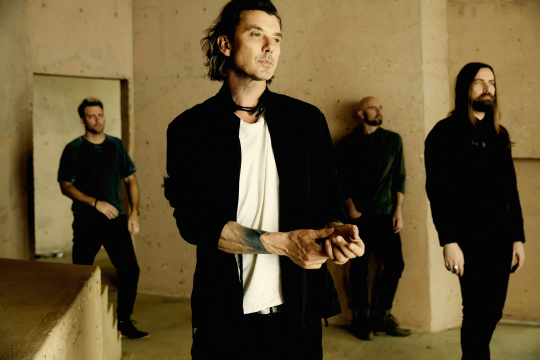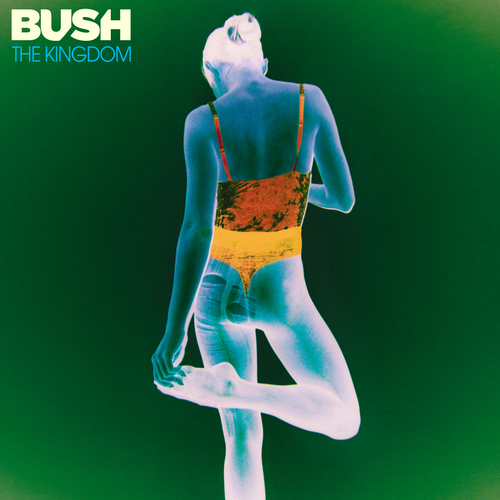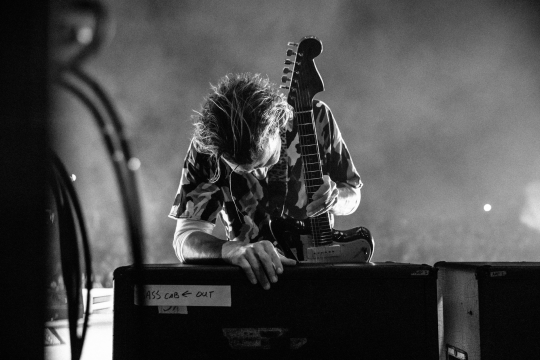
What is there to say about hard rock heroes Bush that hasn’t already been said? For nearly 30 years now, the English rock act – lead by outgoing frontman Gavin Rossdale – has been a constant staple in the rock n roll hierarchy.
Producing hits after hits like “Glycerine,” “Machinehead,” “The Chemicals Between Us,” “The Sound Of Winter” and so much more, Rossdale and Co. really don’t have much left to prove at this point.
Nevertheless, gearing up to release their eighth studio album The Kingdom on July 17th, the beloved band is still striving to share their best material yet.
“I think it just comes down to a real love of what we do,” explains Rossdale. “I mean, it sounds glib but it’s that simple. You put in the effort that you want.”
Rossdale adds, “It seems weird just because I’ve been around for so long that we should take the foot off the gas. [If you’ve] been around for long, you should keep your foot on the gas to make sure you justify staying around and you’re not just like some kind of nostalgia machine.”
To read more of our in-depth interview with Rossadale covering everything from Post Malone to Tom Waits, be sure to see below. Afterward, make sure to pre-order The Kingdom here.

At this point, we feel like talking about quarantine is almost like talking about the weather but we’d be remiss not to ask how you’ve been keeping busy lately.
GAVIN ROSSDALE: [Laughs] Yeah, I’m always busy but don’t really know how. I’m just puttering around doing my thing and just tending to various things in my house. To me, it’s like doing the same thing as everyone else, like, everything and nothing [at the same time].
Did you check out Post Malone’s Nirvana tribute?
Yes! Yeah, that was great.
It’s crazy how good it sounded. They really pulled it off.
It was fantastic. It’s a really, really good band, really good players and great songs and they did a wonderful job.
Speaking of Post Malone, do you pay much attention to what’s going on with Top 40 radio and pop music?
I mean, I happen to like Post Malone. I went to go see him. Thought it was a really great show. I remember when “White Iverson” first came out I was like “What is this?” and I remember saying to all my friends like, “With someone this brilliant, where’s the rest of it? I don’t understand. You’re that good, where’s the rest of it?” And then suddenly, it was all about The Weeknd. He was doing massive and [Post Malone] had “White Iverson” as sort of like the loan track out there. And then boom, [Post Malone] just came in and frickin’ took over. He’s phenomenal, you know, because he covers so many bases and it’s just interesting, intriguing and irreverent and that’s just wonderful.
Do you think Post Malone is pretty much the prototype rock star for the music scene nowadays?
He totally is. I mean, absolutely. And deservedly so. He’s a complicated character [but] you know, everyone loves a bit of Posty [laughs].

With rock music having such an up and down place in popular music lately, we’re curious where you feel it fits in the musical landscape next to artists like Post Malone.
Um, you know, it’s so weird because on one hand it’s like this art form that no one knows about that’s dead in the water and nothing’s happening. And then [on the other hand] you can go play to three or four hundred thousand people in the summer. So it’s weird. It’s definitely not part of [pop] culture or the zeitgeist of the day the way Post Malone is. But having said that, you get someone like Fall Out Boy going on a stadium tour with Green Day. So it’s weird, I can’t really work it out. Some things are done with high visibility for everyone to know about and some things are more counterculture and rock is just like super counterculture, I guess, for a lot of people.
Is that frustrating for someone like you who has new music coming out and obviously wants Bush to be in the forefront and grab people’s attention?
I mean, when I first began doing this – especially in England – rock music was complete counterculture. Like, very, very small and there were just a chosen few that were into it despite the large numbers at Glastonbury and Reading or wherever. But it just felt like [Rock] wasn’t at every kind of hair dresser or pharmacy and supermarket. You know, what I mean? It wasn’t like the soundtrack to everyday life and things have gone back to that really, that’s all. I mean, to me, I still love all the great rock bands. You know, I saw Post Malone and thought he had a great show but I still don’t know if I wouldn’t rather go see Slipknot or System Of A Down.
How closely do you pay attention to emerging bands in the hard rock scene? Do you still have your finger on the pulse when it comes to that?
I mean, you know, to an extent. I mean, in the sense that I don’t claim to know everything that’s going on by any stretch. I never did and never will. But yeah, when things are happening and bands are emerging of course I hear about them and get to check them out and it’s exciting to me. You know, I’ve always been of the mindset that there’s room for everyone to be great. You know, the battle is with yourself because everybody wants more than one song to fall in love with. So someone else’s great song is not a barrier or anything competitive to me. Because it’s like, my job is just to make music that people want to listen to. So I want people to listen to “Flowers On A Grave” and listen to something else that turns them on.
That’s a good transition into Bush’s new record, The Kingdom. Being in a new era of hard rock music, was there any part of you that wanted to experiment a little? Or did you just want to keep the same Bush mindset?
Well the mindset is always to be as interesting or as good as possible, irrespective of the zeitgeist, you just want to be good. We’ve been doing some shows and the band has been getting better and better playing together so the record feels divine and large and wide. It’s got a magical energy to it and I think it’s a really interesting time because The Kingdom is based on this idea of a place where like-minded people could gather and it was sort of an anti-judgment, anti self-righteous, safe place for creative people. You know, we all love Charles Bukowski, so everyone loves Bukowski and that’s The Kingdom – that’s kind of the mindset. So it’s weird because I really thought about the differences of the people that I can’t stand, that self-righteous judgment, and I’ve had a few people around me that really made me think like that. Then we went into this quarantine where we’re supposed to come out and be sort of emotionally cleansed and replenished and intellectually replenished and sort of culturally enriched and when we come back we’re going to be the best part of ourselves and boom, that’s The Kingdom.
It’s interesting how it ties in so well with everything going on right now considering you started writing this well before quarantine was even an idea. What initially sparked those concepts?
I’m just dealing with two separate individuals in my life where I just had enough of this self-righteous judgment I was experiencing from these two separate individuals. And so, in spite of their terribleness as people, they inspired me to think of how can I have a world where neither of these two people exist.

Looking back on 1999 when you guys put out “The Chemicals Between Us,” that was sort of an experimental track for you guys that featured electronic elements very fitting of that time period. Was there any desire to do something like that on this record?
The experimental thing for me was to find a way to have warm aggressive riffs and putting melodies on them [or] finding melodies in a secret garden within heavy riffs. That’s what it was about. Those are the strength in the defiance that I think is the central core to it. You know, you still have vulnerability in there. It’s really wonderful to do it with concepts rather than programming. I mean, because it’s just nothing – it’s not experimental in the sense that it’s been experimented with before. You’re just sort of using different tools. And just for me, I thought that writing the record basically on baritone guitars was an interesting approach.
In 2020, it’s almost more experimental to just release a record with nothing but actual instruments and doing a real rock record.
Yeah it’s funny, you know, you want to get into all that stuff then you spend a year recording and the right songs rise to the top and you just incorporate those on the record. So you’re kind of down in the trenches more than having an overview [of what’s going on around you]. So only now, I realize “wow the record is powerful and wide” as opposed to being experimental – I mean experimental in this sort of, you know, like Glenn Branca or Sun Ra Arkestra or, you know, experimental like Brian Eno. Those are the things that are probably like, you know, when I have a finite number of records left to make, it just feels like this is the right one to make right now. The irony is that, of course, there’s no touring for now and not for probably a year I imagine. So it’s ironic and I hope that by the time we get to play the record that’s it not a record that’s been forgotten, it’s a record that’s found its way deeper into people’s playlists.
Talking about touring, there are talks of doing reduced capacity shows to keep with social distancing. Would you be interested in doing some sort of intimate show where everyone keeps their space but it’s in a small, closed venue?
I’m not sure if “interested” is the right word. If it’s small, would I do that because that’s the best way to do something? Of course, you know, I’d do whatever is required and whatever keeps people safe. But I mean ultimately, my goal is to be back in the audience. For me specifically – because as a performer I love to go in the crowd and I love the interaction of breaking the wall of the stage [and being in] the audience – so for me, that’s really like, “Wow, now I’m not meant to do that anymore?” I guess not for now.
Hopefully we’ll have some sort of end in sight and everything can go back to normal here pretty soon. But for now, looking at Bush’s career: As you approach almost 30 years as a band, what are some of the things that still motivate you to put out some of the best music of your career?
I think it just comes down to a real love of what we do. I mean, it sounds glib, but it’s that simple. You put in the effort that you want, you know. I can’t imagine writing a song that I don’t try and make it a great song. I can’t imagine writing an album that doesn’t have a point. You know, for me, we could write 10 mid-tempo, nonsense or indiscriminate songs and that could be it. But, I don’t know, quality is just everything. I mean, Tom Waits said the way you do anything is the way you do everything. So that’s essentially how I feel about life. And that includes my career and it’s my career. So it seems weird just because I’ve been around for so long that we should take the foot off the gas. [If you’ve] been around for long, you should keep your foot on the gas to make sure you justify staying around and you’re not just like some kind of nostalgia machine. It’s really essential for me to be able to have records now that stand on their own two speakers versus “Oh yeah, don’t worry, that was a new one but we’re going to play Razorblade Suitcase now.” So it’d be nonsense, you can’t think like that. And I think that music is so beautiful, you’re always just trying to find ways to get better. I look at my favorite bands and I realize that the ceiling, for writing and stuff like that, I haven’t even touched the scale of what’s to be done musically.




